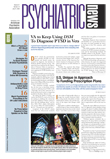Buried for years in the Pentagon's list of conditions it classifies as mental disorders is one that more than three decades ago psychiatrists stated is not a disorder at all.
It turns out that while APA acted to remove homosexuality from its compendium of psychiatric illnesses in 1973—a decision backed by all major medical and mental health organizations—the military chose until last month to maintain its labeling of homosexuality as a mental disorder.
The list that included homosexuality was contained in a section of“ Department of Defense Instruction Number 1332.38,” delineating“ Conditions Not Constituting a Physical Disability” and a subsection titled “Developmental Defects and Other Specific Conditions.” The Department of Defense (DoD) document was last issued in 2003 and is current DoD policy.
Immediately after the Pentagon's policy came to light last month, APA Medical Director James Scully Jr., M.D., sent a letter to William Winkenwerder Jr., M.D., assistant secretary for health affairs at DoD, asking him to“ update” the document listing the disorders, which the DoD calls an “instruction,” to eliminate homosexuality from the list. Scully emphasized that, “based on scientific and medical evidence, APA declassified homosexuality as a mental disorder in 1973—a position shared by all other major health and mental health organizations based on their own reviews of the science.”
American Psychological Association Executive Director Gwendolyn Keita, Ph.D., also sent Winkenwerder a letter citing APA's removal of homosexuality from the DSM in 1973, urging a need to remove “the stigma of mental illness that has long been associated with homosexual orientation.”
Protests also quickly made their way from Capitol Hill to the Pentagon. Eight members of Congress joined Rep. Martin Meehan (D-Mass.), a member of the House Armed Services Committee, in a letter to Defense Secretary Donald Rumsfeld stating that it is “disappointing” that the Pentagon continues to label homosexuality a mental disorder “more than 30 years after the mental health community recognized that such a classification was a mistake. There is no scientific basis for such a classification, which leads me to believe that the classification is motivated by something more sinister.”
Meehan's letter also calls on Rumsfeld to bring all medical policies and regulations in line with current professional thinking to “meet the mental health care needs of all of our servicemen and women, including the estimated 65,000 lesbian, gay, and bisexual services members serving in our armed forces today.”
All of the protests along with considerable media coverage apparently led the DoD to act in an uncharacteristically rapid manner. On June 28, less than two weeks after the list of disorders became public, Pentagon officials deleted homosexuality from the list. The department issued a statement saying,“ Homosexuality should not have been characterized as a mental disorder.” It said that a “clarification” would soon be issued that acknowledges and corrects the policy.
“I am glad that the Pentagon agreed—23 years too late—to bring its list of disorders up to date when the error was brought to its attention” said Serena Yuan Volpp, M.D., chair of the APA Committee on Gay, Lesbian, and Bisexual Issues. “I hope Pentagon officials continue to work on making the culture of the military less discriminatory toward gay and lesbian service members.”
The change will have no effect on any policies at the DoD, including its discharge of any service member whose homosexuality becomes known—the“ don't ask, don't tell” policy. The Pentagon affirmed this by noting that while it will remove homosexuality from the disorders list, doing so “will have no practical impact” since it was just a list of conditions. ▪
